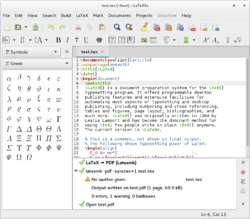| GNOME LaTeX | |
|---|---|
| | |
 LaTeXila 3.14 under GTK 3.14 | |
| Developer(s) | Sébastien Wilmet, community, The GNOME Project |
| Stable release | |
| Repository | |
| Written in | Vala, C |
| Operating system | Linux |
| Platform | GTK |
| Available in | Multilingual |
| Type | TeX/LaTeX editor |
| License | GPL-3.0-or-later |
| Website | gitlab |
GNOME LaTeX (up to version 3.26 known as LaTeXila) is a TeX/LaTeX editor to edit TeX/LaTeX documents. It runs on Linux systems with the GTK library installed.